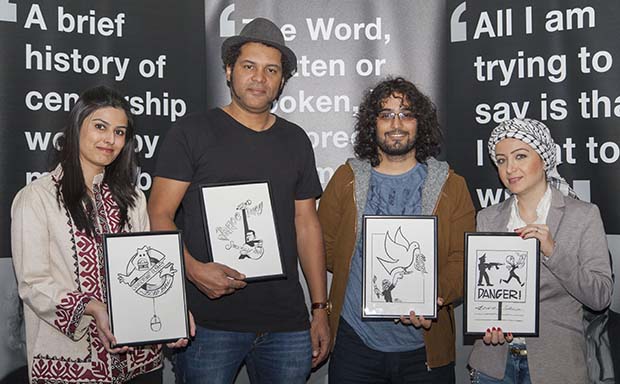6 Oct 2016 | Europe and Central Asia, Magazine, Russia, Student Reading Lists, Volume 45.03 Autumn 2016 Extras
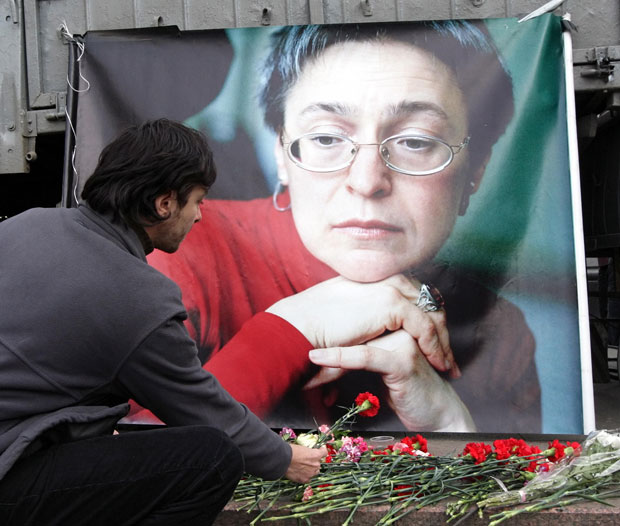
A man lays flowers near the picture of murdered journalist Anna Politkovskaya, during a rally in Moscow, Russia, 7 October 2009. CREDIT: EPA / Alamy Stock Photo
On 7 October 2006 investigative journalist Anna Politkovskaya was shot and killed in her apartment building in Moscow. In the latest issue of Index on Censorship magazine, Russian journalist Andrey Arkhangelsky reflects on Politkovskaya’s legacy 10 years on and looks at the state of journalism in the country today.
Politkovskaya, who worked for newspaper Novaya Gazetta, was known for her investigative reporting, particularly looking into the atrocities committed by Russian armed forces in Chechnya, and her criticism of the Putin administration.
She was a recipient of an Index on Censorship Freedom of Expression Award in 2002.
Ahead of the anniversary of her death, Index has compiled a reading list of articles written for the magazine both by Politkovskaya and about her. The collection also includes articles exploring media freedom in Russia and why the deaths are Russian journalists seem to go unnoticed and uninvestigated.

From The Cadet Affair: the Disappeared; an extract, written by Anna Politkovskaya, was published in the winter 2010 issue of Index on Censorship magazine
From The Cadet Affair: the Disappeared
December 2010; vol. 39, 4: pp. 209-210.
In 2010 Index published this extract from Nothing But the Truth: Selected Dispatches, a collection of Politkovskaya’s best writings. In this piece, she writes about the disappeared in Chechnya.
Standing Alone
January 2002; vol. 31, 1: pp. 30-34.
An interview with Politkovskaya who, at the time of publication, was living in Vienna, having been sent there for her own safety by Dmitry Muratov, editor-in-chief of Noveya Gazetta, after receiving threats from high-ranking officials who had been annoyed by her reports from Chechnya.
Codes of conduct
March 2012; vol. 41, 1: pp. 85-95.
Irena Maryniak considers the hidden network of relationships that continue to shape Russian society, undermine the rule of law and protect the status quo. In this article Maryniak highlights Politkovskaya’s concerns of the effects of the Kremlin’s reach and her work reporting on the atrocities inflicted on the Chechen population by the Russian armed forces and the Russian-backed administration of Akhmad Kadyrov.
Years of Living Dangerously
November 2009; vol. 38, 4: pp. 44-58.
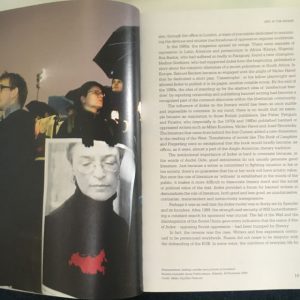
Grit in the engine by Robert McCrum, in the 40 year anniversary issue of Index on Censorship magazine.
Maria Eismont talks to Dmitry Muratov, editor of the newspaper Novaya Gazeta, at which Politkovskaya spent seven years as a journalist, about his struggle for press freedom and justice in Russia.
Stopping the Killers
November 2009; vol. 38, 4: pp. 31-43.
In this article Joel Simon, of the Committee to Protect Journalists, discusses how impunity is an urgent issue facing press freedom campaigners; and, after reflecting on Politkovskaya’s murder, outlines a roadmap for action
The Big Squeeze
February 2008; vol. 37, 1: pp. 26-34.
Edward Lucas explains how during Putin’s presidency media freedom has moved from the imperfect to the moribund, in an adaption from his book The New Cold War: how the Kremlin menaces Russia and the West.
Grit in the engine
March 2012; vol. 41, 1: pp. 12-20.
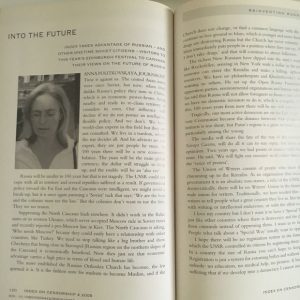
Into the Future; Index interviews Anna Politkovskaya in the winter 2005 issue of Index on Censorship magazine.
Robert McCrum considers Index’s role in the history of the fight for free speech, from the oppression of the Cold War to censorship online; and highlights how Politkovskaya turned to Index for help in making the west understand the dangers Russian journalists face.
Into the Future
November 2005; vol. 34, 4: pp. 120-125.
Index interviews Politkovskaya at the Edinburgh Festival, in which she discusses the future of Russia.
“We lost journalism in Russia”
September 2015; vol. 44, 3: pp. 32-35.
Andrei Aliaksandrau examines the evolution of censorship in Russia, from Soviet institutions to today’s blend of influence and pressure.
Power of the pen
December 2010; vol. 39, 4: pp. 17-23.
Carole Seymour-Jones celebrates the achievements of 50 years of fighting for authors’ freedoms and explains why there is so much more work to be done.
You can read Andrey Arkhangelsky’s article by subscribing to the magazine or taking out a digital subscription from anywhere in the world via Exact Editions (just £18* for the year). Each magazine sale helps Index on Censorship fight for free expression worldwide.
*Will be charged at local exchange rate outside the UK.
Magazines are also on sale in bookshops, including at the BFI and MagCulture in London, News from Nowhere in Liverpool and Home in Manchester; as well as on Amazon and iTunes. MagCulture will ship to anywhere in the world.
6 Oct 2016 | Awards, Bahrain, Campaigns, Campaigns -- Featured, mobile
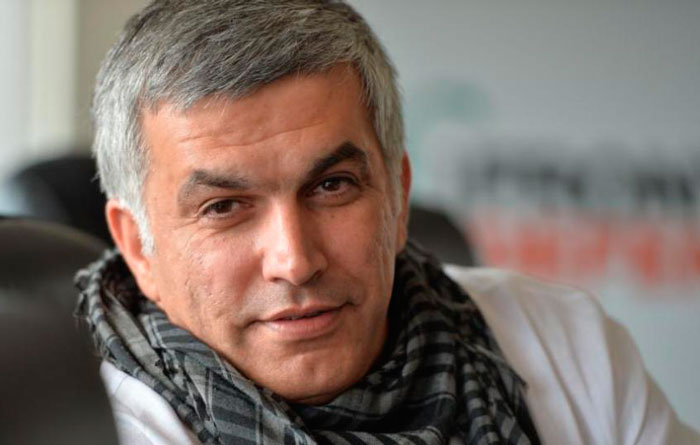
A Bahraini high criminal court has postponed the sentencing of leading human rights defender Nabeel Rajab, who faces up to 15 years in prison for messages posted on Twitter.
Rajab, the president of the Bahrain Center for Human Rights, is on trial on multiple charges of “disseminating false rumors in time of war”, “insulting a neighboring country” and “insulting a statutory body” under articles 133, 215 and 216 of the penal code. The charges collectively carry up to 15 years in prison. These are in relation to remarks he tweeted and retweeted on Twitter in 2015 about the humanitarian crisis caused by the Saudi-led war in Yemen – with Saudi Arabia the “insulted” country – and documenting torture in Bahrain’s Jau prison.
In September, Bahrain’s prosecution brought new charges against him for “undermining the prestige of the state” after the New York Times published his opinion piece, Letter from a Bahraini Jail. This charge could carry an additional year.
Back in January 2014, when Stephen Colbert asked Human Rights Watch executive director Ken Roth who the next Nelson Mandela would be, Roth named Nabeel Rajab. This week, Human Rights Watch writes: “Is it right or trite to compare Rajab to Mandela? That’s a matter for debate, but it’s certainly reasonable to compare states’ deification of one activist with their silence over another, and Mandela – a vocal supporter of free expression – would surely have seen the double standard.”
HRW’s Roth hit out again on Twitter yesterday: “He’s Bahrain’s Nelson Mandela but the West doesn’t show anywhere near the same concern for his plight.”
Last month, 22 rights groups wrote to 50 countries urging them to call for Rajab’s release. All 50 states, including the UK, had previously raised concerns over Bahrain’s human rights situation. However, until now only the United States has called for Nabeel Rajab’s release. The EU’s Special Representative for Human Rights Stavros Lambrinidis said yesterday on Twitter: “In Bahrain, the EU closely follows tomorrow Nabeel Rajab’s trial. Hope for his release from jail and commencement of national reconciliation efforts.”
Husain Abdulla, Executive Director, Americans for Democracy & Human Rights in Bahrain: “When countries go silent on Nabeel Rajab’s imprisonment because of the Gulf’s strategic importance, that is short-sighted and shameful. The US has talked a good talk on Nabeel: now let’s see them act on it.”
The UK has made no clear statement on Nabeel Rajab, apart from expressing “concern”. In November, Prince Charles will be visiting Bahrain, as well as Oman and the United Arab Emirates, to improve bilateral relations.
Sayed Ahmed Alwadaei, Director of Advocacy, Bahrain Institute for Rights and Democracy: “British silence will consign Rajab to this fate. The UK could have intervened, criticised the situation or called for an end to this flagrantly unfair trial on countless occasions, and so far they have failed to step up every single time. This act of repression is not just the fault of Bahrain, but the fault of every ally which enables Bahrain to continue in this way.”
In September, the UN High Commissioner for Human Rights used his opening statement at the 33rd session of the Human Rights Council (HRC) to warn Bahrain: “The past decade has demonstrated repeatedly and with punishing clarity exactly how disastrous the outcomes can be when a Government attempts to smash the voices of its people, instead of serving them.” Today’s sentencing is yet another case of the Bahraini government attempting to smash those voices.
Rajab has been held in pre-trial detention since his 13 June 2016 arrest, which coincided with the opening of the June session of the HRC. He was initially held in East Riffa, where police kept him in solitary confinement. After 15 days in solitary – which the UN’s top expert judges may amount to torture – he required urgent medical attention. Rajab was rushed to the Bahrain Defence Force hospital with breathing difficulties, an irregular heartbeat and a weak immune system. He was transferred back to a police station for detention the following day.
Since 2011, Rajab has faced multiple prosecutions and prison sentences for his vocal activism. The state banned him from travel in 2014, preventing him from leaving the country.
More about Nabeel Rajab:
6 Oct: Join us to tell the UK to help free Bahraini Nabeel Rajab
Bahrain: Nabeel Rajab put in isolation ahead of 6 October trial
Rights groups urge 50 nations to call for Nabeel Rajab’s release
5 Oct 2016 | Asia and Pacific, Awards, Fellowship, Fellowship 2016, News and features, Pakistan
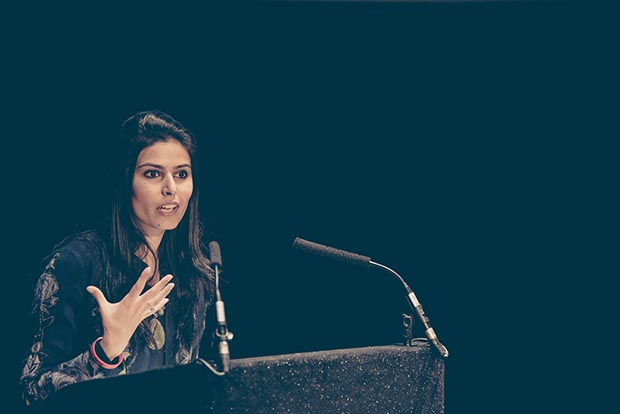
Farieha Aziz, director of 2016 Freedom of Expression Campaigning Award winner Bolo Bhi (Photo: Elina Kansikas for Index on Censorship)
Pakistan’s Prevention of Electronic Crimes Bill 2015, better known as the cyber crimes bill, has severe implications for freedom of expression and the right to access information in the country.
After a lengthy process, the bill was signed into law on 22 August 2016. Bolo Bhi, the Pakistani non-profit promoting digital freedoms and winner of the 2016 Index on Censorship Freedom of Expression award for campaigning, has been fighting the bill through all it’s stages and will continue to do so even now it has been approved.
“We are looking at what will be the right approach and the current debate is whether we jump to court and challenge it on constitutional grounds or wait for there to be an executive review and then build a case around it,” Farieha Aziz, director of Bolo Bhi, told Index on Censorship.
Bolo Bhi has reached out to other organisations and individuals, including the Human Rights Commission of Pakistan and several lawyers, during its campaign against the bill, and if legal action is to be taken it will be a class action involving all of all of these parties.
“We’ve gotten some of the best constitutional minds in the country to start looking at the law and where we go from here,” Aziz said.
Such action would be costly and, as pro bono doesn’t always guarantee success, the group have begun reaching out to people who may be able to provide support.
At this early stage amendments to the bill won’t be possible. “So we want to build pressure through public dialogue in terms of what’s wrong with the bill and what needs to be fixed,” Aziz said. “We will also raise awareness of how this law can be used against various communities.”
Pakistan has a large youth population – they very people having most conversations online – and they need to know how the bill will impact them, Aziz explained, so Bolo Bhi has been doing a lot of work with students. “We want to see the youth take ownership of this issue and see that discussion around such laws should not be relegated to the legal fraternity or the legislature.”
In terms of building pressure, the movement needs that student community voice. “It’s something we can’t leave untapped,” said Aziz.
Fighting the bill took up a lot of Bolo Bhi’s time over the past year and the organisation doesn’t currently have a staff beyond Aziz and fellow director Sana Saleem, nor an office in which to work from.
But fortunes may be changing. As Index spoke with Aziz, a possible fund to cover operational costs and salaries for a year was on the cards for Bolo Bhi. The organisation has always been small and even with this funding it would remain so, allowing it to stay focused on certain issues.
“And maybe in the next month or two we will even have an operational office again,” Aziz added.
With this in mind, Aziz is hopeful that Bolo Bhi will be send more time on its gender work. “We’re members of the Women’s Action Forum and with the recent passing of the anti-domestic violence bill there’s been a lot of discussion on the provincial protection of women, so that’s something we are focusing on,” she said.
On a case-by-case basis, a lot of victims and survivors of abuse get in touch with the network. “Just yesterday we spoke to a young girl who was forcibly married at 15, is now divorced with a young child and is being harassed by her own family,” Aziz explained. “We’re now trying to get protection and see what legal proceedings are necessary.”
This is just some of the work that goes on on the side and is what Aziz hopes she can do more of in future.
As always, the main challenge is funding.
“While it’s important for us to keep on top of the issues, at the same time we’re trying to get enough support to keep us afloat.”
Also read:
Smockey: “We would like to trust the justice of our country”
Zaina Erhaim: Balancing work and family in times of war
Artist Murad Subay worries about the future for Yemen’s children
GreatFire: Tear down China’s Great Firewall
Nominations are now open for 2017 Index on Censorship Freedom of Expression Awards. You can make yours here.
4 Oct 2016 | Index in the Press
It is 12 days since the British authorities confiscated the passport of the Syrian journalist, Zaina Erhaim, a prominent critic of Bashar al-Assad.
And it is four days since press freedom and human rights groups launched a joint protest over a decision that is, to be frank, a disgrace. Read the full article







